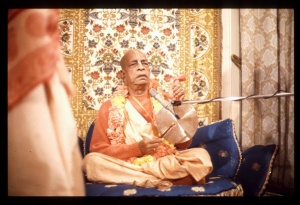SB 7.10.24

A.C. Bhaktivedanta Swami Prabhupada
TEXT 24
śrī-nārada uvāca
prahrādo 'pi tathā cakre
pitur yat sāmparāyikam
yathāha bhagavān rājann
abhiṣikto dvijātibhiḥ
SYNONYMS
śrī-nāradaḥ uvāca—Nārada Muni said; prahrādaḥ—Prahlāda Mahārāja; api—also; tathā—in that way; cakre—executed; pituḥ—of his father; yat—whatever; sāmparāyikam—ritualistic ceremonies performed after death; yathā—even as; āha—order; bhagavān—the Supreme Personality of Godhead; rājan—O King Yudhiṣṭhira; abhiṣiktaḥ—he was enthroned in the kingdom; dvi-jātibhiḥ—by the brāhmaṇas present.
TRANSLATION
Śrī Nārada Muni continued: Thus, as the Supreme Personality of Godhead ordered, Prahlāda Mahārāja performed the ritualistic ceremonies for his father. O King Yudhiṣṭhira, he was then enthroned in the kingdom of Hiraṇyakaśipu, as directed by the brāhmaṇas.
PURPORT
It is essential that society be divided into four groups of men-brāhmaṇas, kṣatriyas, vaiśyas and śūdras. Here we see that although Prahlāda was perfect in every respect, he nonetheless followed the instructions of the brāhmaṇas who performed the Vedic rituals. Therefore in society there must be a very intelligent class of leaders who are well versed in the Vedic knowledge so that they can guide the entire populace to follow the Vedic principles and thus gradually become most perfect and eligible to return home, back to Godhead.